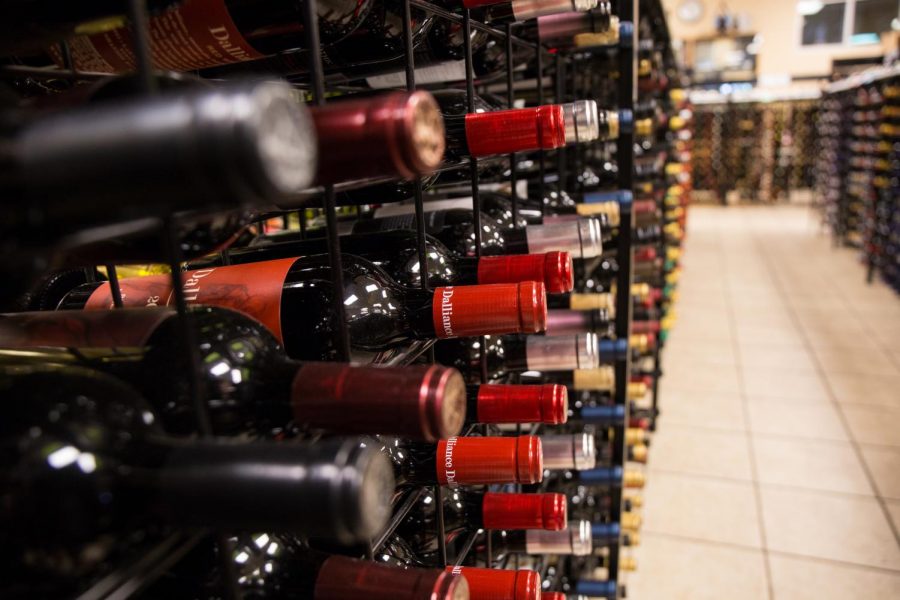Reese: The Self-Sabotaging DABC Should No Longer Control Utah’s Alcohol Industry
The Utah State liquor store on July 11, 2018. (Photo by Justin Prather | Daily Utah Chronicle)
March 1, 2020
If there is anything new visitors learn about Utah, it’s that our state has an interesting relationship with alcohol. Utah’s infamous “Zion curtains” — barriers to block customers’ ability to see alcoholic drinks being made in restaurants — were a source of ridicule before their fall. Karaoke and axe-throwing venues have been denied beer licenses, and the state regularly runs out of bar licenses. And when state law changed to permit stronger beer — allowing Utah to catch up to the rest of the United States — a funeral party was held for 3.2% beer.
While Utahns may enjoy jokes about the ridiculous way our state controls the alcohol industry, it actually highlights a huge problem. The state has a near-monopoly on an industry that it has no business dictating. With the state calling the shots, both employees and customers are at a loss.
The DABC Claims Not to be a Business, But It Sure Acts Like One.
The state Department of Alcoholic and Beverage Control (DABC) argues that they are not a retail business and that it is their mission to regulate the sale, licensing and consumption of alcohol. I find it funny that the DABC says they are not a business, considering claims made in a recent op-ed by DABC Chair John T. Nielsen. Nielsen touts the profit of state liquor stores, the expanding liquor store locations and the shelf inventory the department has curated.
I’m no business major, but it sure as hell sounds like the DABC is running a retail business to me. No other government agency would make a public statement about their ability to make a profit. Of course, Nielsen’s agency is different in that they control the entire alcohol enterprise, so I guess he sees no problem promoting the DABC’s unchallenged business model.
It is ironic that Nielsen touts how well-run the DABC is, considering the recent shut down of two different liquor stores in Richmond and Tremonton. The Richmond store had an employee who lived in the back of the store after his divorce and spent much of his time consuming the inventory. In Tremonton, amounts ranging from $2,000 to $11,000 went missing from monthly funds, and the DABC responded by shutting the location down. Similar action was taken when funds went missing from Payson and Eden stores.

Looking to Make a Livable Wage? Try Starbucks Over the DABC
Fiscal responsibility does not seem to be a priority of the DABC, which is surprising considering how willing they are to cut corners on employee pay. The poor leadership of the DABC has prevented employees who work in liquor stores from being paid a livable wage. A part-time sales clerk makes $9.31 an hour and a full-time sales clerk makes $10.86. These wages are some of the lowest in the nation for liquor store employees. In a recent job posting for an assistant manager, the hourly wage is $13.53. By comparison, an average assistant manager at McDonald’s makes around $14 an hour and an assistant manager at Starbucks comes in higher at about $17-$19 an hour.
While some argue that the state can’t pay as well as corporations, several listed government jobs make more money than an assistant manager at a state liquor store. A barista working at the Utah National Guard’s Camp Williams can make around $12-$15 an hour, plus tips. A buildings/grounds supervisor for the Department of Natural Resources makes between $16.35-$25.86 hourly. A library resources intern for the Department of Heritage and Arts makes $15 an hour. Liquor stores are state-run, so workers should have comparable wages with other state workers.
DABC Leadership Intentionally Undercuts the Success of Their Own Stores
Consumers also lose out in the current system. Despite Nielsen’s claims, the inventory in the state-controlled stores is not as high quality as it could be. Former DABC employee Gary Clark recently wrote about the retirement of Francine Giani, who was responsible for weakening the department by limiting selection and services. Giani’s time at the department was known by staff as the “reign of terror,” and she did her best to turn the DABC into another inefficient government department.
In a recent opinion published by the Salt Lake Tribune, Terry Marasco highlights why returning liquor sales to the free market would be better for Utah. As a business owner, Marasco understands that many Utahns cross the state border to access better selection and pricing. Thanks to the DABC, business is being driven out of Utah and in towns like Wendover. For a state government that is obsessed with business and growth, this failure is an unnecessary self-inflicted wound.
The DABC is an inefficient bureaucracy whose workers are understaffed, underpaid and completely mismanaged. A state-owned monopoly is against Utah’s beliefs in a free-market and market competition. At this point, it would be wiser to permanently take liquor sales out of state hands.










Connie Bradbury • Mar 1, 2020 at 1:39 pm
How about posting how much money the state receives from liquor sales. I’ve compared prices on box wine and there is almost a $5 per box difference between Utah (high) and Nevada. Check out a Montana.